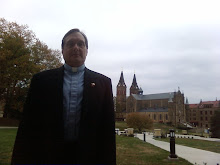
Gn 18:20-32
Col 2:12-14
Lk 11:1-13
Prayer; as much as I hate to admit it, I do not spend enough time at it. Oh sure, as a member of the ordained clergy I say the required prayers, but beyond that, I don’t spend nearly enough time praying. Like most people these days, I don’t have a lot of time, but that’s not the main reason I don’t seem to pray enough. For me, and I think for many of us, so often when I pray, nothing happens. I want to feel all of these wonderful things, I want to have a great emotional experience, but I don’t. I want the things I’m praying for to happen NOW, but they don’t. So discouraged, disheartened, and maybe even a little disillusioned, I don’t pray. Even though I know better, I don’t pray. If anyone came to me saying these very things, I would encourage them to keep praying, to be persistent, to never stop. So why can’t I take my own advice? Because it’s easier to stop than to struggle through, persistence is hard, it takes effort, sometimes more effort than we are willing to expend. Yet today’s readings speak to us of prayer, and of the importance of being persistent. God speaks to Abraham, telling him that he is going to check out all the stories about Sodom and Gomorrah, and if they are true, well, let’s hope they aren’t, because you don’t want to be there if they are. Abraham then dares to approach God asking if God will sweep away the innocent with the guilty. Would God spare the city if there were fifty innocent people there? God acquiesces to Abraham’s request, but Abraham does not stop, continuing to ask God to spare the Sodom and Gomorrah until God agrees to spare Sodom and Gomorrah even for the sake of ten innocent people. In the Gospel a man has visitors show up late at night, and he has nothing to feed them. He goes to his neighbor seeking to borrow three loaves of bread, and is rebuffed. Go away, I’m in bed, I’ve already locked the door, but our man is persistent. He doesn’t go away, he continues asking until his neighbor relents and gives him what he needs. In each of these cases it would have been easy for either Abraham or the man with the late arriving guests to walk away. Abraham, after all, got essentially what he wanted on his first attempt. Our breadless friend could simply have said, sorry, I won’t bother you anymore, and sought another way to care for his guests. Persistence helped them get the things they needed. The hard work of persistence helped them get what they needed, and maybe to appreciate it. We want everything, and we want it yesterday. (That, however, is another homily.) Jesus tells us, “Seek and you will find, ask and you will receive.” Our breadless friend got what he needed by asking. Abraham got what he wanted by asking.
“What father among you would hand his son a snake when he asks for a fish? Or hand him a scorpion when he asks for an egg? If you then, who are wicked, know how to give good gifts to your children, how much more will the Father in heaven give the Holy Spirit to those who ask him?” What we need is there for us, God wants us to have it, all we have to do is ask. As difficult as it may seem at times, as much as we may not want to, even though it may at times seem pointless to us, what we have to do, what we need to do, is pray.
Deacon John
17th Sunday in Ordinary Time
July 29, 2007
Col 2:12-14
Lk 11:1-13
Prayer; as much as I hate to admit it, I do not spend enough time at it. Oh sure, as a member of the ordained clergy I say the required prayers, but beyond that, I don’t spend nearly enough time praying. Like most people these days, I don’t have a lot of time, but that’s not the main reason I don’t seem to pray enough. For me, and I think for many of us, so often when I pray, nothing happens. I want to feel all of these wonderful things, I want to have a great emotional experience, but I don’t. I want the things I’m praying for to happen NOW, but they don’t. So discouraged, disheartened, and maybe even a little disillusioned, I don’t pray. Even though I know better, I don’t pray. If anyone came to me saying these very things, I would encourage them to keep praying, to be persistent, to never stop. So why can’t I take my own advice? Because it’s easier to stop than to struggle through, persistence is hard, it takes effort, sometimes more effort than we are willing to expend. Yet today’s readings speak to us of prayer, and of the importance of being persistent. God speaks to Abraham, telling him that he is going to check out all the stories about Sodom and Gomorrah, and if they are true, well, let’s hope they aren’t, because you don’t want to be there if they are. Abraham then dares to approach God asking if God will sweep away the innocent with the guilty. Would God spare the city if there were fifty innocent people there? God acquiesces to Abraham’s request, but Abraham does not stop, continuing to ask God to spare the Sodom and Gomorrah until God agrees to spare Sodom and Gomorrah even for the sake of ten innocent people. In the Gospel a man has visitors show up late at night, and he has nothing to feed them. He goes to his neighbor seeking to borrow three loaves of bread, and is rebuffed. Go away, I’m in bed, I’ve already locked the door, but our man is persistent. He doesn’t go away, he continues asking until his neighbor relents and gives him what he needs. In each of these cases it would have been easy for either Abraham or the man with the late arriving guests to walk away. Abraham, after all, got essentially what he wanted on his first attempt. Our breadless friend could simply have said, sorry, I won’t bother you anymore, and sought another way to care for his guests. Persistence helped them get the things they needed. The hard work of persistence helped them get what they needed, and maybe to appreciate it. We want everything, and we want it yesterday. (That, however, is another homily.) Jesus tells us, “Seek and you will find, ask and you will receive.” Our breadless friend got what he needed by asking. Abraham got what he wanted by asking.
“What father among you would hand his son a snake when he asks for a fish? Or hand him a scorpion when he asks for an egg? If you then, who are wicked, know how to give good gifts to your children, how much more will the Father in heaven give the Holy Spirit to those who ask him?” What we need is there for us, God wants us to have it, all we have to do is ask. As difficult as it may seem at times, as much as we may not want to, even though it may at times seem pointless to us, what we have to do, what we need to do, is pray.
Deacon John
17th Sunday in Ordinary Time
July 29, 2007









